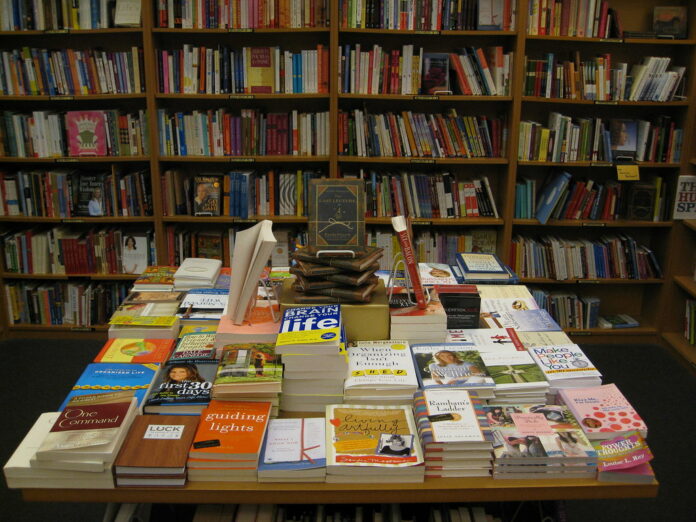If “self-help” worked, there would be no self-help industry
“Lean In: Women, Work, and the Will to Lead” is a self-help book that exploded back in 2013 by once-chief operating officer of Facebook, Sheryl Sandberg. It’s going to teach me how to succeed as a woman in the workplace for $23 (but a lot of feminists sure as heck don’t think it is helpful to the self to cater to male corporate culture). The Secret is an $8 film, $11 book combo that contains the great mystery of the universe and will bring joy to all areas of my life, but a large mob may run me out of town for deriding it, such is its rabid fan base. “He’s Just Not That Into You” was such a helpful self-help book ($9), it was made into an ensemble romcom ($10) starring everyone ever.
How embarrassing for us that these books are often best sellers. Dr. Phil (not an actual doctor) is now a ubiquitous self-help household name who got his start from Oprah. Anthony Robbins, the motivational speaker who now boasts an entire self-help empire, charges $3,000 for a weekend seminar. Need I mention every diet fad ever? (I was totally into South Beach once upon a time.)
I found out the self-help book has been around since 1859. A guy named Samuel Smiles started all this ridiculousness when he published an aptly titled book, Self-help, containing the adage, “Heaven helps those who help themselves.” How very American.
We are still — I want to say, “for better or for worse,” but it just feels like “for worse” — a staunchly Puritan society, pathologically prude and hardworking. I’m pretty sure we all have a “pull yourself up by your bootstraps” meme tattooed somewhere on our bodies whether we know it or not — a kind of obligatory patriotic birthmark. Every American knows, if you fail at anything, it’s obviously your own fault for not working hard enough. If you had only applied yourself harder, put in more overtime, sweated at the gym more, you could have succeeded. Poverty, homelessness, illiteracy, disease — you are clearly lazy and unpatriotic. Unhappy? It is your own fault. Get off your butt!
Enter the self-help industry. It’s a $12 billion dollar money-maker that thrives disproportionally on women. Over 13 million relationship self-help books, for example, were sold in 2007 alone. Eighteen thousand life coaches work in the United States, over whom there are no official oversight regulating credentials, as in, anyone can call themself a “life coach.”
The worst offending self-help titles can be identified by their cliche soundbite advice. Their easy fixes to all of life’s problems turn into phenomenon that operate awfully similar to addictions. With an endless virtual Amazon aisle of selections to choose from, there is always another Finally-I’ve-Found-The-Answer-To-ALL-My-Problems (for $20) sweet relief to get high on. These books, audio recordings and weekend retreats are lies and escapes from the reality that the solutions to our problems are complex and messy and nonlinear and perhaps counterintuitive and uncomfortable.
Instead of false dead ends that repeatedly deplete our bank accounts, we can instead get connected to the human beings around us (terrifying, I know) and solicit advice from the living and breathing — for free. I googled this strategy, also an option — and corroborated it — for free.
We can ask a friend. Or, we can find someone who has done what we want to do, been through what we are going through and talk to them and capitalize on their lived experience. Just flip the script. It feels good to be helpful, to have our own expertise, whatever that may be, sought out. In helping ourselves get outside the pages of a book that seeks to exploit us, we have the power to give others a very cool feeling of being needed.
If self-help worked, there would be no industry. No one would remain unhappy with their weight, their relationships, the states of their closets, their level of anxiety and so on. What precious few publications or “gurus” mention is that true personal development is messy and does not necessarily feel good. Making lasting positive change takes a long time, and that is a hard sell on a glossy hard cover jacket (“BE FRUSTRATED AND UNCOMFORTABLE WHILE YOU SLOWLY CHANGE YOUR LIFE FOR THE BETTER”).
Another more recently trending alternative is the anti-self-help self-help movement, which states that by focusing on what we want to improve about ourselves all the time — what we don’t like about ourselves — we are making ourselves miserable. This version of self-help says stop helping and just accept your own mediocrity. This is the key to happiness! But it’s still a book you have to buy. Counter culture is still culture.
Written by: Lauren Frausto — lrfrausto@ucdavis.edu
Disclaimer: The views and opinions expressed by individual columnists belong to the columnists alone and do not necessarily indicate the views and opinions held by The California Aggie.





